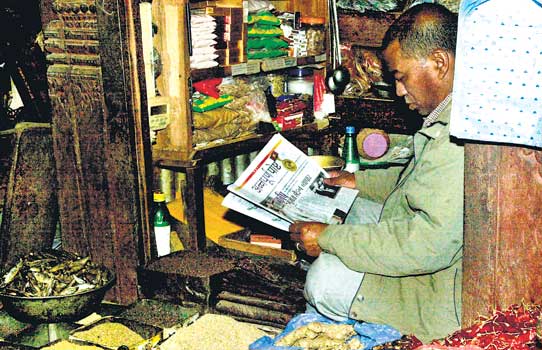
|
Nepal parties, Maoist rebels approve interim constitution KATHMANDU, Saturday, (Reuters) - Nepal's ruling alliance and Maoist rebels today approved the draft of an interim constitution, a key step to implement their landmark peace deal ending a conflict which has killed thousands, negotiators said. The document, an interim law that paves the way for Maoists to join a provisional parliament and government, was signed by top leaders of the alliance including Prime Minister Girija Prasad Koirala and the Maoist rebel leader Prachanda.
“This is yet another major achievement for the establishment of peace in Nepal,” said Bharat Mohan Adhikary, a senior leader of the Communist-UML party, the second biggest group in the seven-party coalition. “The prime minister will carry out the work of the head of state and the king will have no right in state affairs,” Adhikary told reporters. Analysts said the beleaguered monarch had no choice but to accept the decision. “There is no alternative for him. Whatever he has lost can't be taken back under the present circumstances,” Lok Raj Baral, chief of Nepal Centre for Strategic Studies, a private think-tank, told Reuters. “Though this is a logical move after the popular movement for democracy it is significant,” he said. Last month, the government and Maoists signed a landmark peace deal declaring an end to the decade-old conflict in which more than 13,000 people have died in the Himalayan nation. The assembly will prepare a permanent constitution for Nepal and decide the future of the monarch. “The king will be there until the elections. But his role is limited to eat food and wait for the constituent assembly decision about his fate,” said Lila Mani Pokharel, a senior leader of People's Front-Nepal, a smaller member of the alliance.Rebel Maoists, who have agreed to confine their fighters in camps and lock weapons in containers monitored by the United Nations, were upbeat. “Now there is a guarantee that elections for the constituent assembly will be held on the basis of this constitution,” chief rebel negotiator Krishna Bahadur Mahara said. The assembly had long been a rebel demand to end their anti-monarchy conflict which began in 1996 and which has also wrecked Nepal's aid and tourism dependent economy and displaced more than 200,000 people. “It (the draft constitution) will be proclaimed after managing the arms and armies in seven to 10 days,” Mahara said referring to an earlier agreement to mandate the U.N. to monitor their weapons. The United Nations says up to 35 monitors are expected to begin work this month but the full monitoring mission will take more time. It has not given any specific timeframe. Under the agreement on arms management, the state army is also to remain in barracks in the run up to the elections set for June 2007. An equal number of its arms are also to be locked in stores. The draft constitution will become effective after the existing parliament approves it and the new assembly -- which will include the Maoists -- endorses it. |
| || Front
Page | News
| Editorial
| Columns
| Sports
| Plus
| Financial
Times | International
| Mirror
| TV
Times | Funday
Times || |
| |
Copyright
2006 Wijeya
Newspapers Ltd.Colombo. Sri Lanka. |
